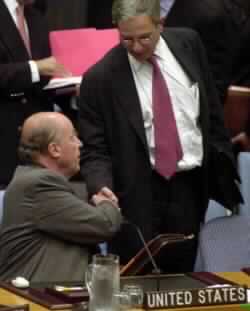HIGHLIGHTS: Missions in Bosnia & Croatian Pennisula of Prevlaka, Held Hostage by Dispute May Now Be Renewed||American Demands for Blanket Immunity Strongly Resisted By All Council Members||At the End on the One Year Exemption Council Will Have to Renew Request|| STORY: The Security Council today concluded an unusual wrangle between the United States and many other members, unanimously adopting a resolution that effectively gives American peacekeepers a year's exemption from prosecution by the new International Criminal Court. (Read photo caption)
After several hours of intense negotiations behind closed doors, the Council held a brief public meeting to adopt the compromise text. Immediately afterward, the Council renewed the mandates of two United Nations peacekeeping missions that had been held hostage by the dispute - the mission in Bosnia and the one in the Croatian peninsula of Prevlaka.
Most members of the Council emerged visibly relieved by the conclusion of a confrontation that had stretched into weeks of tense negotiations between the United States and a growing body of nations. Those nations, including the entire European Union, Mexico and Canada, formed a strong front to resist the American demands for blanket immunity for American peacekeepers from the new court.
The compromise resolution drew on an existing article in the 1998 Rome Statute under which the International Criminal Court was created, declaring that for one year, the court would not open proceedings against any United Nations peacekeeping personnel from countries that do not accept the court. The Council would have to renew the request after that.
For the Bush administration, the resolution was a retreat from its initial demands for blanket immunity with almost automatic annual renewal. For the other members, simply allowing the Security Council to interpret an existing international treaty was a concession.
In the end, both sides claimed to have satisfied their core demands. Americans had relative immunity for a year, the Europeans maintained the integrity of the court, and for both sides, peacekeeping could continue.
PHOTO CAPTION
The United States Ambassador to the United Nations John Negroponte, left, shakes hand with Nicolas Rostow, legal advisor of U.S Mission after a meeting of the Security Council at the United Nations headquarters in New York July 12, 2002. The U.N. Security Council voted unanimously to exempt U.S. peacekeepers from war crimes prosecution for a year Friday, ending threats to U.N. peacekeeping operations. (AP Photo/Osamu Honda)
Email this story - View most popular
- Author:
& News Agencies - Section:
WORLD HEADLINES


 Home
Home Discover Islam
Discover Islam Quran Recitations
Quran Recitations Lectures
Lectures
 Fatwa
Fatwa Articles
Articles Fiqh
Fiqh E-Books
E-Books Boys & Girls
Boys & Girls  Hajj Rulings
Hajj Rulings Hajj Fatwas
Hajj Fatwas














